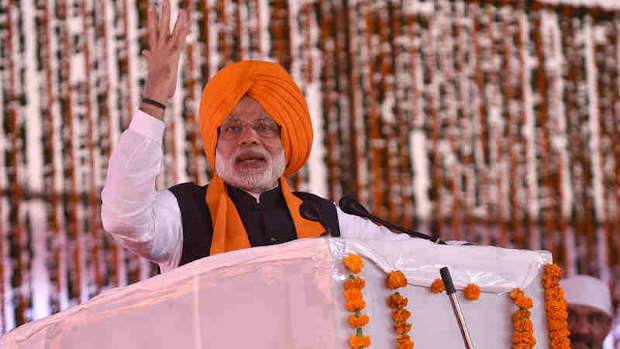Modi Govt Using Technology to Attack Journalists: 10 Human Rights Groups
Indian authorities are increasingly targeting journalists and online critics for their criticism of government policies and practices, including by prosecuting them under counterterrorism and sedition laws, ten human rights organizations said on May 2.
The Indian authorities should respect the right to freedom of expression and release any journalists detained on trumped-up or politically motivated charges for their critical reporting and stop targeting journalists and muzzling independent media.
The authorities’ targeting of journalists, coupled with a broader crackdown on dissent, has emboldened Hindu nationalists to threaten, harass, and abuse journalists critical of the Indian government of prime minister (PM) Narendra Modi, both online and offline, with impunity, the groups said.
The organizations are Committee to Protect Journalists, Freedom House, PEN America, Reporters Without Borders (RSF), International Federation of Journalists, CIVICUS, Access Now, International Commission of Jurists, Amnesty International, and Human Rights Watch.
[ Also Read: Modi Must Release Details of His Picnic in Europe ]
Amid growing restrictions on media freedom, Indian authorities have arrested journalists on spurious terrorism and sedition charges, and have routinely targeted critics and independent news organizations, including raiding their workplaces.
Journalists and online critics also risk prosecution under the Information Technology Act and IT Rules of 2021 for content critical of the authorities. Indian authorities have been implicated in using the Israeli-produced spyware Pegasus to target journalists.
In addition, the authorities’ frequent internet shutdowns hamper the ability of journalists to do their work, including accessing and disseminating information online.
These restrictions on media freedom come amid an escalating crackdown on civil society by the Bharatiya Janata Party (BJP) government of PM Modi, which is using sedition, counterterrorism, and national security laws to target and prosecute human rights activists, students, government critics, and peaceful protesters. Journalists from minority groups and those in Jammu and Kashmir are particularly at risk, the groups said.
Authorities in BJP-led Uttar Pradesh state have repeatedly filed false charges against journalists for publishing content and social media posts critical of the government.
Since 2017, after BJP leader Yogi Adityanath became the state’s chief minister, the authorities have filed criminal cases against 66 journalists. Another 48 journalists have been physically attacked, according to a February 2022 report by the Committee Against Assault on Journalists. Journalists in small towns and villages reporting in Hindi language media are at even higher risk of being targeted and prosecuted by authorities.
In Jammu and Kashmir, the government has intensified its crackdown after it revoked the state’s special autonomous status in August 2019 and split it into two federally governed territories.
Since then, at least 35 journalists in Kashmir have faced police interrogation, raids, threats, physical assault, restrictions on freedom of movement, or fabricated criminal cases for their reporting.
The authorities have ramped up raids on homes of journalists and activists, and confiscated their cell phones. In June 2020, the government announced a new media policy that gave more power to the authorities to censor news in the region.
Authorities in Kashmir are also using preventive detention under the Jammu and Kashmir Public Safety Act against journalists, which allows them to arbitrarily detain people without evidence and thorough judicial review.
Journalists in Kashmir have also struggled to do their reporting work because of frequent internet shutdowns by the authorities in the region. According to Access Now, India shut down the internet at least 106 times in 2021, “making it the world’s biggest offender for the fourth consecutive year.” Within India, Jammu and Kashmir was the worst affected, with at least 85 shutdowns.
The government is increasingly using technology to curtail human rights and stifle freedom of expression online. In February 2021, the Indian government published the Information Technology Rules, which imperil freedom of expression and the right to privacy.
These rules empower the government to summarily compel the removal of online content without any judicial oversight. They also jeopardize encryption, which is crucial for ensuring privacy and security online, and routinely used by journalists to protect their sources and themselves from being targeted.
The Editors Guild of India said the rules undermined media freedom. Three UN human rights experts have expressed concern that the rules do not conform with international human rights norms.
The Pegasus Project found that over 40 Indian journalists appeared on a leaked list of potential targets for surveillance. The Indian government has repeatedly stalled attempts to investigate these allegations. This perpetuates an environment of surveillance impunity that results in a chilling effect on free speech and media freedoms, the groups said.
The groups urged the Modi government to protect the right to freedom of expression, including by immediately releasing journalists who are arrested for their critical reporting, ending broad and indiscriminate internet shutdowns, withdrawing the media policy in Jammu and Kashmir, and repealing the Information Technology Rules.
“The authorities should also conduct prompt, thorough, independent, and impartial investigations into allegations of threats and attacks targeting journalists and critics, including from government officials,” the groups said. “Journalists should not have to risk their freedom and their lives to do their work.”













